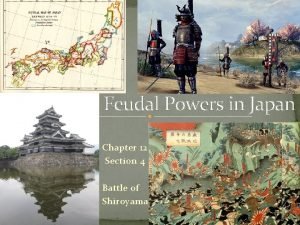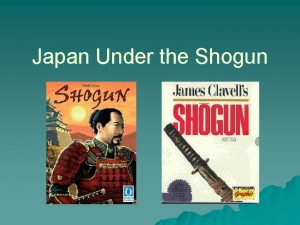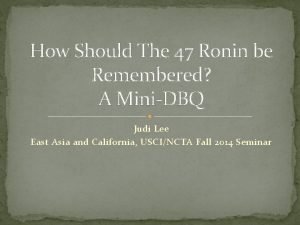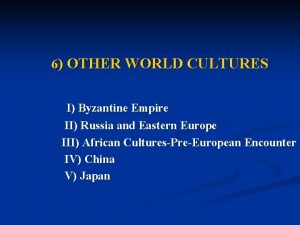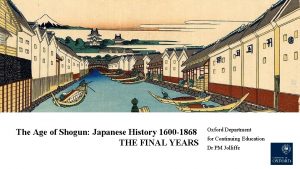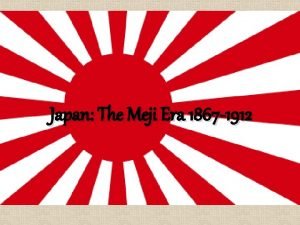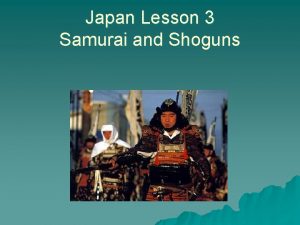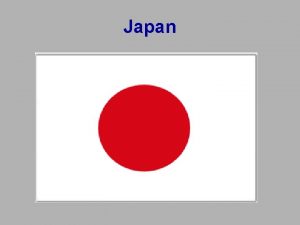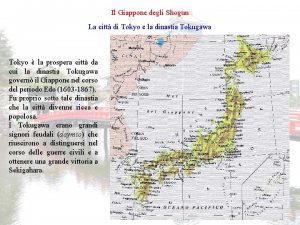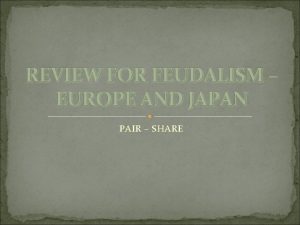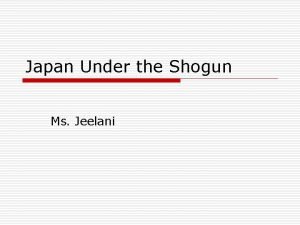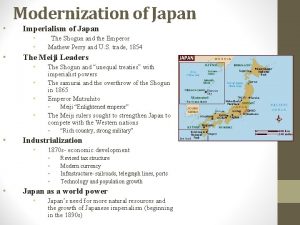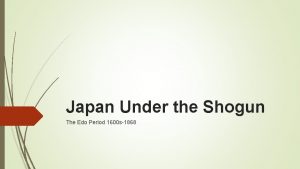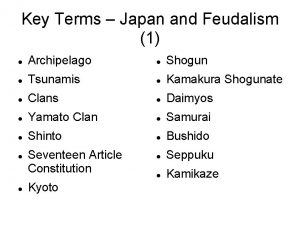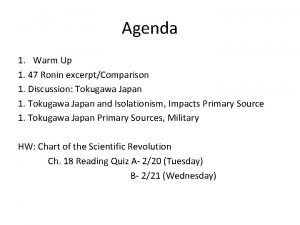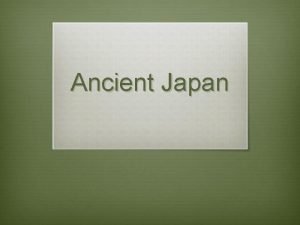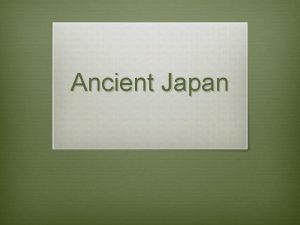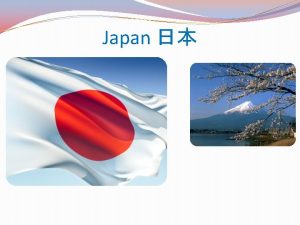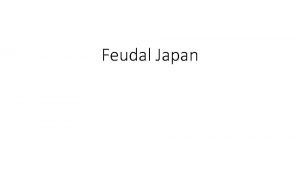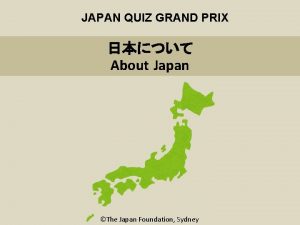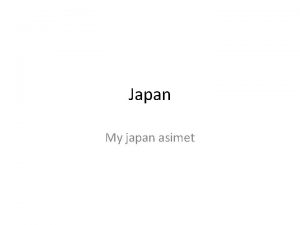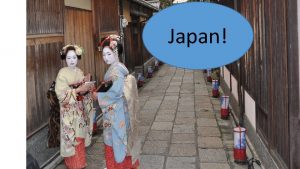Japan Under the Shogun The 47 Ronin Shogun















































- Slides: 47

Japan Under the Shogun

The 47 Ronin Shogun: a Japanese military ruler in Edo Japan u Ronin: Samurai warriors without masters u Samurai: professional, paid members of the Japanese military u Seppuku: Ritual suicide performed in Japan as an honourable alternative to humiliation and public shame u Shogunate: A strong council of advisors, officials and administrators u

STORY A Japanese story about 47 ronin who obtained revenge for their masters death

u Graves of the 47 ronin. On December 14, the anniversary of the attack on Lord Kira, Japanese people honour the memory of the 47 ronin.

The Edo (Tokugawa)Period - The period in Japanese history between 1600 -1853 This story took place during the Edo or Tokugawa Period (Edo Restaurant) u Edo: The name for the old capital city of Japan. It is now called Tokyo. u

In the hundred years before the Edo period, Japan was locked in almost constant warfare u Daimyo: A powerful Japanese landowner or noble, competed with one another for territory and power u

Technology u Edo Period u Now

Tokugawa Ieyasu (Toe-koo-guhwuh Ee-ay-yuh-soo) u u Tokugawa Ieyasu: The Shogun in the Edo period Became the most powerful man in Japan Although the emperor technically ruled the land, the shogun really held all the power Emperor: Ruler of Japan

Ieyasu He won power through military strength but now he needed to hold onto it u He was determined to create a strong shogunate that no one would challenge u

u The Plan u u u His plan was to create a long-lasting stable government The first step was to control the Daimyo, some of whom had fought against him before he became the shogun He gave land to loyal lords and put them next to those he questioned Three main parts of the plan were: a) Alternate attendance b) Sharing Power c) Strict Laws

Brining Stability to Japan Alternate attendance u Alternate Attendance: The practice of forcing the daimyo to move from their home provinces to live in Edo every other year. u The cost of keeping two homes and moving every other year meant that the daimyo would not have the time or money to challenge the shogunate

The daimyo were forced to leave family members in Edo while they were gone u They were called “guests of the shogun” but really they were hostages u If there were any uprisings or rumours of a plot that involved an absent daimyo, his family members were killed u

Sharing Power u Bakuhan: A two-level system of government where the Shogunate, (like our federal government) controlled important matters such as foreign trade and relations and the daimyo controlled local affairs.

Strict Laws u u Laws established by the shogunate controlled many aspects of the daimyo’s lives, such as dress and marriage They also required the daimyo to pay for projects such as road building in their territories, this restricted their wealth

u u Increasing the shoguns power Law that banned peasants from owning weapons Secret police to punish those accused of threatening shoguns power ¼ all farm land, mines, ports & cities owned by shogun u u Decreasing the daimyo’s power Without weapons, peasants were useless Needing permission to marry - destroyed alliances Daimyo were kept busy collecting taxes and keeping order of local villages

u u Japan had a feudal system which was based on land Feudalism: The system of political organization in which the lord controlled the land supported themselves by collecting taxes from peasant farmers. The rigid social structure was to help the shogun maintain control Membership into each class was hereditary: (determined by birth) A Feudal Society u Although people could not move up, people could improve their situation through hard work, talent or gaining wealth

Roles in Society u u u Strict rules governed the behaviour of each class There were 216 rules regulating dress for everyone from the emperor to the lowest member Peasants were not allowed to wear silk, even if they were silk farmers

Bowing Rules There were rules about to whom each person had to bow and how low u Punishments were harsh for anyone who disobeyed u Japanese Bow 3: 38 u https: //www. youtu be. com/watch? v=v dl. NZJ_TFXU u

The Samurai The samurai lived in castle towns controlled by the shogun or daimyo they served u Only the Samurai were allowed to have swords u They carried a large curved sword, sharp enough to slice an enemy in two, and a smaller sword used to cut off the head of the defeated enemy u

Samurai Hierarchy u There were many sub-divisions in the Samurai ranks u The lowest and least honourable were the ronin, the samurai without masters

u u u Although they had privilege and status, they were forbidden to become involved in business or trade In peaceful times they worked as officers in towns The Samurai code of honour dictated that they live simple and thrifty lives

The Way of the Warrior The Samurai stood for many virtues, honour, bravery, unquestionable loyalty, selfdiscipline and selfdenial u A Samurai was expected to be brave when faced with pain or death u

Honour u u u The idea of honour is key to understanding the samurai Honour: To have high respect for someone or something Ready to die for his honour or the honour of their daimyo The samurai had the privilege of committing suppuko When committing suppuko the samurai would plunge a small u sword into his abdomen and slice it open Then, an aide would end the Samurais pain by beheading him

u u Seppuko was considered even more honourable if the samurai composed a poem at the time of his death Suicide Forest in Japan 21: 08 min http: //www. youtub e. com/watch? v=4 F DSdg 09 df 8 u About the forest: u http: //en. wikipedia. or g/wiki/Aokigahara

u u Japanese Sword Soul Of The Samurai 28: 01 https: //www. youtube. com/watch? v=IMFtaw cjh 7 E&noredirect=1

The Social Hierarchy of the Edo Period Warriors Peasantry Artisans, Craftsmen Merchants, Tradesmen Townspeople Non-Humans Outcasts

A peasants Life u Peasants labour was continuous and backbreaking u The more you squeeze them, the more oil you get out of them u What does this mean?

Peasants u u u Farmers were considered important because they provided food that sustained society Laws controlled every aspect of their life They were forbidden to smoke tobacco or drink rice wine, and they needed special permission to travel outside of their district

Artisans u u Usually lived in towns and cities An artisans son was restricted to his fathers class as well as the particular craft Useful and beautiful objects were produced – lacquered or enamel containers, high quality paper and porcelain, clocks & pans Although artisans were extremely skilled, their status was lower than peasants because they were not primary producers

Merchants u u u They bought items from artisans to trade or sell to others They arranged for shipping and distribution of food & stored rice in their warehouses Merchants were similar to bankers, why?

Merchants continued u u u Since they didn’t officially produce anything, they too were at the bottom They had to live cautiously as government spies reported merchants who showed off their wealth or dared to criticize the government The government could punish by confiscating, or taking over their business

Women in Edo Society u The class that women were born into determined their responsibilities u Women born into Samurai class were expected to raise boys as samurai u Woman in rural areas had more freedom that upper class women

Women’s Jobs u u u As well as working the home, they worked in the fields with their husbands harvesting crops, gathering wood, and rising silk worms Women were always considered lower than men Women did not have legal existence, they could not own their own property

Thoughts on Women u A woman must think of her husband as her lord, and she must serve him reverently… In her dealings with her husband, her facial expressions and her language should be courteous, humble and yielding. She should never be peevish or obstinate, never rude or arrogant. When her husband issues instructions, she must never disobey them…A woman should look on her husband as if he were heaven itself.

Geisha u u u a Japanese woman trained to entertain men with conversation and singing and dancing In the Edo period prostitution was legal Strict distinction between prostitutes and geisha Memoirs of Geisha ~Snow Dance (HD) https: //www. youtu be. com/watch? v=6 3 Fx. LM 3 AQt 4 3: 03 minutes Geisha Power Point

Outside Edo Society u u u Outcasts: Japanese people who were shunned or ignored by other classes because of the type of work they did Usually they had occupations that in some way involved death What kinds of jobs would you guess?

Outcast Professions Leather tanners, butchers and those who disposed of animal carcasses were all outcasts u People with leprosy and some entertainers were also considered outcasts u

Outcasts u u Under the Tokugawa shogun, outcasts had to live apart from the rest of society, and they were not allowed to change their jobs, enter a peasants home, or be in a city after 8 pm Ainu were considered outcasts

Confucianism u u The teachings of Confucianism played and important role in the Japanese acceptance of class distinctions Confucius was a Chinese scholar whose teachings for moral (right) living were brought over to Japan by Buddhist monks

Confucius taught that everyone has a proper place in society u If everyone accepted their duties and obligations there would be peace and order, if not, chaos and suffering u

u u u Many of Confucius' sayings encouraged people to be modest and work/ study hard He stressed the need for rituals of proper behaviour and compassion One of his famous sayings was “What you do not wish for yourself, do not do to others”

First Contact with the West u In 1534, 50 years before Tokugawa Iyeasu united Japan, the Europeans were starting to explore the world

Southern Barbarians: (a member of an uncivilized people) u u In 1543 a Portuguese ship was wrecked off the shore of a small Japanese island They came to trade Because they came from the south they became known as the “southern barbarians” They were soon followed by Spanish, Dutch and British traders as well as Christian missionaries

u At first the Portuguese and Japanese liked each other, however, they did have many differences (cultural and religious) u Portuguese – favoured competition, individuality (humanism) and a more flexible social structure

New Kind of Belief u u Francis Xavier, a Jesuit, arrived in 1549 to start missions to convert the upper class (daimyo & samurai) to Christianity We saw this happen with the Aztecs, how did they respond?

The Japanese already had Shinto, Confucianism, and Buddhism u The Christian idea of one god was new for the Japanese u

A Challenge to the Shogunate It became clear that Christians loyalty was to god in heaven, whereas the Japanese were expected to be loyal to their daimyo, emperor and the shogun u Flag of the Japanese emperor u
 Was the rise of the shogun beneficial for japan overall
Was the rise of the shogun beneficial for japan overall Edo period technology
Edo period technology 47 ronin document
47 ronin document Nomads definition world history
Nomads definition world history Emperor shogun daimyo samurai peasants
Emperor shogun daimyo samurai peasants Byzantine definition
Byzantine definition Shogun age
Shogun age Samurai ranks
Samurai ranks Shogun pyramid
Shogun pyramid Emperor shogun daimyo samurai peasants
Emperor shogun daimyo samurai peasants Dinastia shogun
Dinastia shogun Japanese samurai hierarchy
Japanese samurai hierarchy Douglas macarthur
Douglas macarthur đại từ thay thế
đại từ thay thế Vẽ hình chiếu vuông góc của vật thể sau
Vẽ hình chiếu vuông góc của vật thể sau Công thức tính độ biến thiên đông lượng
Công thức tính độ biến thiên đông lượng Thế nào là mạng điện lắp đặt kiểu nổi
Thế nào là mạng điện lắp đặt kiểu nổi Tỉ lệ cơ thể trẻ em
Tỉ lệ cơ thể trẻ em Lời thề hippocrates
Lời thề hippocrates Dạng đột biến một nhiễm là
Dạng đột biến một nhiễm là Vẽ hình chiếu đứng bằng cạnh của vật thể
Vẽ hình chiếu đứng bằng cạnh của vật thể độ dài liên kết
độ dài liên kết Quá trình desamine hóa có thể tạo ra
Quá trình desamine hóa có thể tạo ra Môn thể thao bắt đầu bằng từ chạy
Môn thể thao bắt đầu bằng từ chạy Sự nuôi và dạy con của hươu
Sự nuôi và dạy con của hươu điện thế nghỉ
điện thế nghỉ Thế nào là sự mỏi cơ
Thế nào là sự mỏi cơ Trời xanh đây là của chúng ta thể thơ
Trời xanh đây là của chúng ta thể thơ Gấu đi như thế nào
Gấu đi như thế nào Thiếu nhi thế giới liên hoan
Thiếu nhi thế giới liên hoan Vẽ hình chiếu vuông góc của vật thể sau
Vẽ hình chiếu vuông góc của vật thể sau Một số thể thơ truyền thống
Một số thể thơ truyền thống Các châu lục và đại dương trên thế giới
Các châu lục và đại dương trên thế giới Thế nào là hệ số cao nhất
Thế nào là hệ số cao nhất Sơ đồ cơ thể người
Sơ đồ cơ thể người Tư thế ngồi viết
Tư thế ngồi viết Bảng số nguyên tố lớn hơn 1000
Bảng số nguyên tố lớn hơn 1000 Hát kết hợp bộ gõ cơ thể
Hát kết hợp bộ gõ cơ thể đặc điểm cơ thể của người tối cổ
đặc điểm cơ thể của người tối cổ Mật thư anh em như thể tay chân
Mật thư anh em như thể tay chân Tư thế worm breton
Tư thế worm breton ưu thế lai là gì
ưu thế lai là gì Thẻ vin
Thẻ vin Bàn tay mà dây bẩn
Bàn tay mà dây bẩn Thơ thất ngôn tứ tuyệt đường luật
Thơ thất ngôn tứ tuyệt đường luật Các châu lục và đại dương trên thế giới
Các châu lục và đại dương trên thế giới Từ ngữ thể hiện lòng nhân hậu
Từ ngữ thể hiện lòng nhân hậu Bổ thể
Bổ thể
